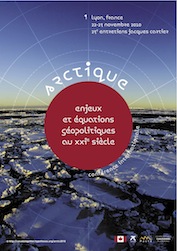CONFERENCE INTERNATIONALE SUR L’ARCTIQUE. ENJEUX ET EQUATIONS GEOPOLITIQUES AU 21E SIECLE
Lyon, 22-23 novembre 2010
Cette conférence internationale sur les enjeux géopolitiques de l'Arctique (22 & 23 novembre 2010 à Lyon) est organisée à l'initiative du Centre d'Etudes Canadiennes de Grenoble et dans le cadre des 23ème rencontres Jacques Cartier.

En discours d'ouverture: Marc Lortie (Ambassadeur du Canada en France) et Michel Rocard (Ambassadeur de France chargé des négociations internationales pour les régions polaires, l’Arctique et l’Antarctique).
Vous trouverez sur le carnet de recherche http://www.hypotheses.org/ toutes les infos sur son déroulement: le programme en français et en anglais - les attendus de la rencontre - le bulletin d'inscription

INTERNATIONAL ARCTIC CONFERENCE. GEOPOLITICAL ISSUES AND EQUATIONS IN THE 21ST CENTURY
Salle de conférences, Caisse d'Epargne, 42 bd Eugène Deruelle, Lyon 3, Metro Part-Dieu Vivier Merle
Lyon, 22-23 November 2010
Presentation In the Arctic, climatic warming is twice as marked as in the rest of the world and the arctic territories are being transformed. The shrinking of the permanent sea ice cover is opening up navigation through the North-West and the North-East passages and massive possibilities are opening up for exploiting the resources of the ocean floor and of its surrounding coastline : oil, gas, uranium, coal, gas hydrates.... 20% of the world’s energy reserves are now thought to be found in the Arctic. The five States bordering on the Arctic (Canada, the United-States, Russia, Denmark/Greenland, Norway) are trying to maintain their national sovereignty over portions of the Arctic Ocean or to increase it through extending it onto the continental shelf. The Russian Federation is claiming a sector, which stretches as far as the North Pole. The ecological impact of climatic warming, already clearly evident, would be further aggravated by any industrialisation of the Arctic. The impact is also a human and social one for the Arctic Native populations. Faced with this situation, are existing juridical arrangements adequate ? What role can be played in the protection of the Arctic by international organisations and institutions (the Arctic Council, the European Union...), or even more so by existing organisations for regional cooperation ? To what extent are the Native populations listened to and in a position to participate in decisions concerning the administering and management of the Arctic ? By bringing together geophysicists, political scientists, jurists, geographers and historians, this international conference intends to discuss and analyse what is at stake in these present controversies, to clarify modes of governance, to explore the possibility of international regulation, in brief to throw scientific light on this urgent and increasingly controversial topic of major geopolitical interest.


